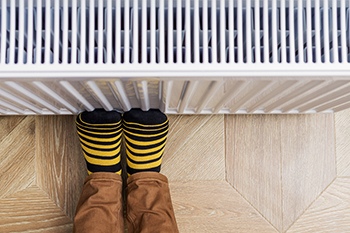If your feet always feel cold, it may be due to one of the following four reasons. 1) You may have poor circulation. Feet need a steady flow of blood to keep them warm. Poor circulation causes blood vessels to constrict which limits the amount of blood traveling to the feet. 2) You may have Raynaud’s syndrome. This is a condition where blood vessels that supply the skin with blood constrict and spasm temporarily, thereby limiting blood flow. This may even cause your skin to change colors temporarily as blood flow is cut off and then returns. 3) You may be overly stressed or anxious. The body’s reaction to extreme stress or anxiety may trigger a “fight or flight” response which can direct blood flow towards larger organs—which are more critical to survival—and away from the extremities. 4) You may have anemia, which is an insufficient amount of red blood cells. Anemia reduces the amount of oxygen in the blood, sometimes causing cold feet. If you are concerned about your feet always feeling cold, contact a podiatrist to determine what the underlying cause may be and to get the appropriate treatment.
While poor circulation itself isn’t a condition; it is a symptom of another underlying health condition you may have. If you have any concerns with poor circulation in your feet contact Donald Manger, DPM of Associated Podiatric Physicians, PA. Our doctor will treat your foot and ankle needs.
Poor Circulation in the Feet
Peripheral artery disease (PAD) can potentially lead to poor circulation in the lower extremities. PAD is a condition that causes the blood vessels and arteries to narrow. In a linked condition called atherosclerosis, the arteries stiffen up due to a buildup of plaque in the arteries and blood vessels. These two conditions can cause a decrease in the amount of blood that flows to your extremities, therefore resulting in pain.
Symptoms
Some of the most common symptoms of poor circulation are:
- Numbness
- Tingling
- Throbbing or stinging pain in limbs
- Pain
- Muscle Cramps
Treatment for poor circulation often depends on the underlying condition that causes it. Methods for treatment may include insulin for diabetes, special exercise programs, surgery for varicose veins, or compression socks for swollen legs.
As always, see a podiatrist as he or she will assist in finding a regimen that suits you. A podiatrist can also prescribe you any needed medication.
If you have any questions, please feel free to contact our office located in Hamilton Township, NJ . We offer the newest diagnostic and treatment technologies for all your foot care needs.

